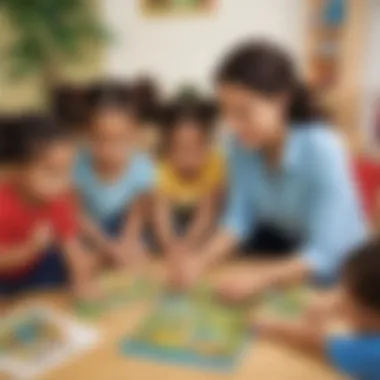Interactive VPK Learning Games for Early Education


Intro
Early childhood education is like planting seeds for the future. It’s during these formative years that children not only soak up language and social skills but also begin to develop critical thinking. In this landscape, VPK learning games stand out as powerful tools to engage and educate preschoolers in fun and interactive ways. These games, designed specifically for Voluntary Prekindergarten programs, play a crucial role in sparking children’s curiosity and enhancing their learning experiences.
But what exactly are VPK learning games? They are more than just a bit of fun; they are thoughtfully crafted activities that align with educational standards and foster various skills. This article aims to paint a detailed picture of how these games transform the early education environment. We will explore the types of games available, their benefits, and effective strategies for integrating them into daily learning routines. Additionally, the discussion will touch on emerging trends in educational gaming that educators and parents should keep an eye on.
So, let’s embark on this journey into the interactive world of VPK learning games and discover how they can enrich the educational paths of our young learners.
Creative Activities
Engaging children in creative activities is a cornerstone of VPK learning. These activities not only stimulate imagination but also contribute to their cognitive and emotional development.
Craft Ideas
Crafting can be a delightful way for children to learn about shapes, colors, and textures. Here are a few simple projects:
- Paper Plate Animals: Using a paper plate and some color markers or paints, children can create their favorite animals. This helps in identifying various animals and discussing their characteristics.
- Nature Collage: Using leaves, flowers, and small twigs collected during a nature walk, children can make a collage. This encourages outdoor exploration and basic science discussions about plants.
Step-by-Step Guides
To help parents and educators, here’s a breakdown of how to make a Handprint Tree:
- Materials Needed: Colored paper, non-toxic paint, and a canvas or sturdy cardboard.
- Instructions:
- Dip a child’s hand in green paint and press it on the paper to create leaves.
- Use brown paint to make a trunk by stamping a finger downward.
- Allow it to dry and discuss how trees grow and their importance in our environment.
Educational Value
Creative activities like crafting teach children fine motor skills, enhance their ability to focus, and improve their capacity for problem-solving. Moreover, they create perfect opportunities for parents and children to bond while learning together.
"Engagement in creative arts leads to children developing a sense of pride in their achievements while reinforcing learning through active participation."
Fun Quizzes
Quizzes are a fantastic way for children to consolidate what they’ve learned in a fun setting. They turn knowledge reinforcement into a game.
Quiz Topics
On platforms like ElemFun, you can find quizzes covering a variety of topics relevant to young learners, such as:
- Animals
- Basic math
- Seasons and weather
- Shapes and colors
Question Types
The quizzes employ multiple forms of questions:
- Multiple Choice: Select the correct answer from the options provided.
- True/False: Decide if the statement is correct or not.
- Fill in the Blank: Encourage children to recall information on their own.
Knowledge Reinforcement
These quizzes are not just for testing knowledge but also serve to reinforce what kids have learned through play-based activities. They enable a seamless blend of fun and education, ensuring that children retain crucial information.
Fact-Based Articles
For further reading and to deepen understanding, fact-based articles present information in a format that children can grasp easily.
Topics
The articles cover a wide array of subjects, including:
- Plants and their habitats
- The solar system
- Basic human anatomy
- Everyday science experiments
Engaging Content
The style of these articles is made to be vibrant and accessible. Language is kept straightforward while also incorporating engaging visuals and examples to grab the child’s interest. This approach helps in transforming even complex topics into relatable ideas.
Ending
VPK learning games present an interactive approach to early childhood education that is invaluable. These games, along with creative activities, quizzes, and fact-based articles, work together to support various aspects of learning. They ensure that children enjoy the educational journey while building essential skills that will serve them well throughout their lives.
Preamble to VPK Learning Games


When we think about the early stages of education, a common thread that ties everything together is play. VPK learning games are fundamental to this concept, where play doesn't stand separate from learning but rather supports it in a seamless tapestry. What lies at the core of these games is the idea that children thrive when they engage in playful interactions, leading to not just academic growth but also social and emotional development. Integrating these games in classrooms can create vibrant, interactive environments that make learning feel less like a chore and more like an adventure.
Understanding the VPK Framework
The VPK, or Voluntary Prekindergarten, framework underscores a structured approach to early childhood education, designed to prepare children for success in kindergarten and beyond. This framework is rooted in the understanding that early years are critical for brain development. Adopting engaging and structured games fits into this method seamlessly.
Within this framework, educators assess how children learn through playful interactions. VPK encourages creativity, curiosity, and critical thinking, all skills that are essential for future academic excellence. With the use of fun activities and games, children not only meet learning objectives but also build a solid foundation that enriches their educational journey.
Importance of Play in Learning
Play is the beating heart of childhood. It goes beyond mere entertainment; it's a vital part of how young minds develop. Engaging in VPK learning games offers children the chance to explore ideas, experiment freely, and learn from their mistakes in a safe environment. As they navigate through these games, kids start to develop essential cognitive skills like problem-solving, memory, and decision-making.
Furthermore, during these play sessions, children learn how to work with others. They pick up on social cues, practice teamwork, and enhance communication skills naturally and enjoyably. It’s not just playing; it’s laying a framework for understanding the world. Children who engage in these types of play-based learning are often more able to transfer their playful insights into real-life scenarios, making play an indispensable educational tool.
"Play is the highest form of research." – Albert Einstein
This insight points to the depth of knowledge that can be gained through play, emphasizing its significance in educational contexts, particularly for early learners. By recognizing the dual role that games can play—as both an enjoyable pastime and a powerful educational method—educators and parents can better appreciate the value of VPK learning games.
Types of VPK Learning Games
When we talk about VPK Learning Games, it’s crucial to explore the various types that exist. These different categories not only cater to diverse learning styles but also ensure children engage with educational material in a manner that feels organic and enjoyable. Understanding these types can help educators and parents identify which methods can foster deeper learning and engagement among preschoolers.
Digital Learning Games
Educational Apps
Educational apps have been gaining traction in recent years, particularly for their adaptability to individual learning paces. These apps often provide tailored experiences through a series of interactive activities that can match a child's learning level. Many applications employ gamification techniques to transform mundane tasks into fun challenges, making repetition less tedious and more inspiring.
One of their standout features is their in-built tracking systems. This allows parents to monitor progress and make informed decisions regarding their child's educational needs. That can be especially beneficial for young learners who might struggle with traditional methods.
However, it’s essential to balance the use of these tools. While educational apps can promote independent learning, excessive screen time might lead to engagement issues or distract from other vital activities.
"Balancing screen use with other forms of play ensures that children develop holistically while still enjoying what technology has to offer."
Online Interactive Platforms
Online interactive platforms provide a communal experience that many children find appealing. With features that allow for collaboration and participation from peers and educators, these platforms can foster a sense of belonging. A key characteristic of these platforms is the integration of various multimedia resources. They often combine videos, quizzes, and engaging visuals that can cater to different learning preferences.
One unique aspect is the ability to host live sessions, where facilitators can guide group activities in real time, making learning dynamic and responsive. Like educational apps, these platforms do come with drawbacks. They can be limiting due to internet connectivity requirements, and not all homes may have sufficient access to technology.
Physical Learning Games
Board Games
Board games can provide a tangible learning experience that digital applications cannot replicate. They encourage face-to-face interaction among children, fostering important social skills in a natural play environment. With a variety of themes that can cover everything from math to vocabulary, these games remain a classic choice in early education. One hub of learning through board games is the immediate feedback they provide. As children make plays or decisions, they see instant outcomes, helping them understand cause and effect. Still, some board games can be complex and might require adults to oversee gameplay, which could limit independent playtime for children.
Outdoor Activities
Outdoor activities harness the natural curiosity and energy of young children. They allow kids to explore their environment while learning about the world around them, blending physical activity with education. This active form of learning can be hugely beneficial for physical development and social interaction. A unique feature of outdoor activities is their ability to adapt to various settings—from parks to backyards; they can be tailored to fit the space available. However, their reliance on favorable weather conditions can sometimes hinder spontaneous learning opportunities. A little creativity can go a long way in ensuring outdoor learning remains flexible and engaging.
In summary, from educational apps to board games, understanding the types of VPK learning games is essential for parents and educators. Each type carries its own benefits and challenges, setting the stage for children to engage in diverse learning experiences.
Educational Value of VPK Games
VPK learning games play a pivotal role in the development of young children, offering several layers of educational benefit. These games are not just about fun; they are finely tuned instruments that cater to various aspects of a child's growing mind. By integrating play with learning, VPK games create an environment where children eagerly absorb knowledge while enjoying the process. The importance of incorporating these games into early education extends far beyond mere entertainment; they help sow the seeds for cognitive, social, and emotional development.
Cognitive Development
Cognitive development is the cornerstone of any educational framework. VPK games nurture this development by encouraging problem-solving skills, critical thinking, and the ability to process information. For instance, a game that revolves around counting objects not only teaches numbers but also helps children understand quantity and comparison.
Incorporating cognitive challenges within games helps children engage their minds effectively. Kids learn to strategize and think ahead while playing simple board games or digital puzzles. This kind of engagement fosters curiosity, as children often ask questions and seek solutions, driving deeper understanding. Therefore, VPK games serve as entertaining yet powerful tools that contribute immensely to a child's cognitive repertoire.
Social Skills Enhancement
Social skills development takes center stage as children interact with peers during game play. VPK games provide a rich platform for them to learn essential interpersonal skills.
Teamwork
Teamwork emerges as a crucial aspect in enhancing social skills. When children work together to achieve a common goal in a game, they learn cooperation and collective problem-solving. It's a practical lesson in sharing, taking turns, and respecting others' opinions.
The key characteristic of teamwork found in VPK games is collaboration. Kids quickly understand that not every task can be completed alone and sometimes, pooling resources leads to better outcomes. A group game where they must build a structure using blocks teaches them to communicate effectively and listen to one another's ideas. This collaborative nature of teamwork is not just engaging but an invaluable learning experience.
- Unique Feature: Children realize that everyone has strengths and weaknesses, leading to a deeper understanding of themselves and their peers.
- Advantages: Encourages empathy, reduces conflicts, and builds lasting friendships.
- Disadvantages: Potential for some children to feel left out, emphasizing the importance of inclusive game designs.
Communication


Effective communication is another vital aspect enhanced through VPK games. Playing together fosters an environment where children practice expressing their thoughts and feelings. As they navigate the rules of a game, they articulate strategies and concerns. This verbal interaction is integral in honing their communication skills.
In VPK settings, communication often flows naturally through game play. Children learn the meaning of verbal cues, body language, and nonverbal signs, enriching their social interactions.
- Unique Feature: Communication in games often requires immediate responses, allowing children to think on their feet.
- Advantages: Enhances vocabulary, encourages clarity of thought, and boosts confidence in speaking.
- Disdavantages: Miscommunication can lead to frustration, which needs to be addressed with guidance.
Emotional Growth
Beyond cognitive and social skills, VPK games also offer vital opportunities for emotional growth.
Self-Regulation
Self-regulation is all about managing emotions and controlling impulses, a necessity in both games and life. VPK games often require children to follow rules and wait for their turn, teaching them the value of patience.
The key characteristic of self-regulation in this context involves understanding consequences. When children don’t abide by game rules, they experience setbacks, allowing them to reflect on their actions.
- Unique Feature: Games can present scenarios that evoke strong emotions, encouraging kids to manage frustration and joy alike.
- Advantages: Helps develop patience, reduces tantrums, and instills discipline.
- Disadvantages: Some kids may struggle to control outbursts, requiring adult support.
Confidence Building
As children grasp new concepts and experience victory in games, their self-assurance flourishes. Confident young learners are more likely to seek challenges and engage willingly in learning environments. VPK games create a safe space for kids to test boundaries and celebrate successes, however small.
The key feature of confidence building through these games is acknowledgment of effort. Teachers or parents can encourage children’s attempts, reinforcing the idea that effort is more important than winning.
- Unique Feature: Games that award progress and milestones allow children to see their growth over time.
- Advantages: Builds resilience, fosters a love for learning, and encourages risk-taking in educational settings.
- Disadvantages: Overemphasis on winning can lead to unhealthy competition; it’s essential to balance praise.
VPK learning games cultivate essential life skills, laying the groundwork for a well-rounded individual who is prepared to face academic and social challenges ahead.
How to Incorporate VPK Learning Games in Classrooms
In the bustling world of early childhood education, finding ways to engage preschoolers can be quite a task. Incorporating VPK learning games into classrooms presents a unique opportunity for educators. These games not just entertain; they enrich the learning environment, paving ways for cognitive, social, and emotional development. A thoughtful approach to incorporating these games can significantly enhance the overall educational experience for young learners.
Setting Learning Objectives
The first step in weaving VPK learning games into the classroom is establishing clear, meaningful learning objectives. These objectives should align with the educational goals set by the VPK framework. Buckling down on specific skills—like recognizing shapes, enhancing vocabulary, or improving coordination—provides a roadmap for choosing the right games. It’s crucial to remember that each game must have a purpose; aimlessly playing can lead to missed learning opportunities.
For instance, if the objective is to bolster language skills, selecting a game that requires children to describe their actions or express their thoughts can be immensely helpful. Educators ought to consider both the short-term goals, like completing a game, and longer-term outcomes, such as improved communication skills. By clarifying what success looks like, teachers can tweak the gameplay for optimum learning outcomes.
Creating a Balanced Curriculum
Implementing VPK learning games isn’t just about throwing some games in amidst traditional lesson plans; it’s about creating a well-rounded and balanced curriculum. This means ensuring a variety of activities that cater to different learning styles and developmental stages. Children learn best when they can alternate between digital and physical games, which promote various skill sets.
Here are a few recommendations to create a balanced curriculum:
- Rotate Between Game Types: Integrate digital and physical games to cater to diverse dynamics in learning.
- Incorporate Different Learning Modalities: Use games that appeal to visual, auditory, and kinesthetic learners.
- Determine Time Allocation: Designate specific time slots for game-based learning, making sure it doesn't overshadow other essential educational activities.
Mixing things up keeps children eager and prevents monotony from creeping into the classroom. Flexibility remains key; educators should be willing to adjust based on the needs and responses of the children.
Assessing Game-Related Learning
Once the games are in play, the focus shifts to assessment. Understanding how these games foster learning is vital for educators. Regular assessment of the child’s progress can be somewhat tricky, but it’s imperative to capture whether the intended learning outcomes are being met. Using both formative and summative assessments helps gauge the effectiveness of games in achieving objectives.
One approach is to observe students while they engage in games. Take notes on how they communicate, solve problems, and work with peers. Additionally, simple checks, like asking them what they learned post-game, can provide insight into their understanding and retention of new information.
Furthermore, educators can create a feedback loop with parents and caregivers. Sharing observations with them, and encouraging them to invite their children to discuss the games they’ve played, enables continued learning outside the classroom. On the flip side, consider adapting games based on feedback to ensure they're continually beneficial and relevant.
In shaping a remarkable learning landscape, incorporating VPK learning games with thoughtful planning allows educators to create vibrant, engaging, and effective learning environments for preschoolers.
Through setting objectives, balancing curriculum, and assessing progress, the integration of these games can transform early education into a journey filled with delightful discoveries and profound growth.
Parent Involvement in Learning Games
In the realm of early childhood education, the role of parents is nothing short of crucial, particularly in the context of VPK learning games. Research has shown that when parents actively engage in their child’s learning process, it often leads to better educational outcomes. By participating in learning games, parents don’t just facilitate fun—they shape a solid educational foundation that can influence their children’s future learning paths. The synergy between home and educational environments enriches the overall experience, encouraging children to see learning as an ongoing and enjoyable journey.
Engaging Parents in Game Selection
When it comes to selecting the right games for VPK learning, parent involvement is paramount. Choosing the right type of games can be a bit like picking fruits at a market; not all of them will suit your taste, but with a bit of guidance, you can pick the best ones. Parents should look for games that cater to their child’s specific developmental needs while also being enjoyable. To ease the selection process, they can consider the following:
- Evaluate Educational Value: Identify games that offer skills practice in areas like literacy, numeracy, and social skills. Educational apps and interactive platforms often come with ratings from educators, which can guide parents in making informed decisions.
- Incorporate Interests: Observe what your child enjoys. If they're drawn to animals, search for games that teach through animal characters. This makes learning feel more like play.
- Seek Recommendations: Many parents share insights through forums or social media groups. Websites like reddit.com can provide practical reviews and tips on effective games.
When parents actively engage in selecting games, it reassures children that learning is something valued and celebrated within the home. This shared decision-making fosters a sense of teamwork and collaboration, creating a richer educational experience.


Facilitating Home Learning
Facilitating learning at home is another vital aspect of parent involvement. It's not enough to simply provide games; parents must consciously create an environment that encourages their child to explore and learn. Here are some effective strategies:
- Establish a Routine: Setting aside specific times for playing these games can help children understand that learning is a part of everyday life. This could be after school or during weekends.
- Play Together: Parents can sit down and play alongside their children. This not only strengthens the bond but also allows parents to see firsthand how their child navigates challenges. They can assist when needed and cheer on small victories, enhancing the child's confidence.
- Discuss Learning Outcomes: After playing, have a chat about what the child learned and how it applies to real-life situations. For instance, if they played a game about counting, parents could incorporate counting into grocery shopping.
Engaging with children during their playtime supports the development of critical thinking and problem-solving skills. Thus, parents become not just facilitators of learning games but also partners in their child's educational journey.
"Parental involvement doesn’t just enhance learning; it creates a nourishing environment where curiosity blooms and knowledge takes flight."
By proactively participating in game selection and facilitating learning experiences at home, parents significantly influence their children’s attitudes toward education.
In the end, the combination of interactive learning games and parental involvement creates a powerful educational dynamic that leads to a more fulfilling and effective VPK experience.
Challenges of Using VPK Learning Games
In the rush of integrating VPK learning games into early education, it's essential to pause and consider the hurdles that may arise. With all the potential these games bring, challenges can easily diminish their effectiveness if not addressed thoughtfully. Recognizing these barriers is key to ensuring that the focus remains on nurturing young minds in a safe, enriching environment. By understanding the specific elements around these challenges, educators and parents can devise strategies that maintain the integrity of both play and education.
Screen Time Management
One of the biggest dilemmas when it comes to using VPK learning games centers around screen time. With screens becoming an integral part of modern education, finding the right balance is crucial. It's not just about limiting time on devices, but about ensuring that when children are engaged with technology, they are doing so mindfully and productively.
Consider this: Too much screen time can lead to physical health issues like eye strain, poor posture, and even hinder social skills when children opt for solitary screen engagement over face-to-face interactions. But, it's also worth noting that not all screen time is created equal. Educators and parents must prioritize educational content that complements the learning objectives.
Here are some strategies for effective screen time management:
- Set Clear Limits: Establish daily or weekly limits on screen usage, making it easier for children to understand that moderation is key.
- Opt for Quality Over Quantity: Choose games and applications that provide educational value, fostering skills such as problem-solving and critical thinking.
- Engage Together: When possible, play digital games alongside children. This creates opportunities for discussion, which helps solidify learning and develops social skills.
Ultimately, managing screen time successfully not only enhances the experience of VPK learning games but also promotes healthy habits that can benefit children for years to come.
Balancing Fun and Education
Another notable challenge lies in achieving a balance between fun and education. While games are meant to delight, it’s vital that the educational aspect does not take a backseat. Can we find playful ways to sow seeds of learning that won’t feel burdensome or contrived?
A common pitfall is designing activities that feel more like chores than enjoyable experiences. Striking the right balance boils down to merging engaging content with educational objectives. Here are tactics that can help in balancing the two:
- Incorporate Learning Goals: Before introducing a game, identify the specific skills or knowledge it targets. This aligns fun with educational outcomes.
- Use Varied Approaches: Diversify the types of games to include both active and passive learning experiences. Physical games can encourage movement while also teaching social dynamics.
- Solicit Feedback: Ask children about what they enjoy and why. Their input can help refine activities to ensure that learning feels organic and enjoyable.
Achieving a perfect balance is an art, and it may require some trial and error. However, when children enjoy their learning experiences through games, they are likely to absorb information better, making the educational impact last longer.
Remember: The goal is to cultivate an environment where learning is not just another task but a thrilling adventure. By addressing the challenges related to screen time and fun versus educational content, we pave the way for a beneficial learning experience through VPK games.
Future Trends in VPK Learning Games
The landscape of early childhood education is continuously evolving, and VPK learning games are at the forefront of these changes. Understanding future trends in this domain is pivotal. These trends not only exemplify the integration of technology in education but also resonate with parents and educators striving to enhance the way children learn through play. Keeping a finger on the pulse of these developments can empower stakeholders to craft educational experiences that are both effective and engaging.
Advancements in Educational Technology
Advancements in technology are stirring the pot in the educational arena. In recent years, we have seen rapid growth in the development of tools designed specifically for early learners. These include interactive tablets, virtual reality experiences, and augmented reality applications that immerse children in their learning environments. The benefits of these advancements cannot be overstated:
- Interactive Engagement: New technologies engage multiple senses, making learning more dynamic than traditional methods.
- Hyper-Adaptability: Many applications are now capable of adjusting difficulty levels based on the child's performance, ensuring a tailored experience that caters to individual learning paces.
- Real-Time Feedback: Instant insights into a child's progress allow educators to make adjustments to their teaching strategies on the fly.
Incorporating such technology leads to a richer learning experience, as children become more active participants in their education.
Increasing Customization of Learning Experiences
Customization, once a luxury, is becoming a necessity in the realm of VPK learning games. Parents and educators are now increasingly aware of how crucial it is to meet the different needs of each child. Children come with a variety of backgrounds, learning styles, and interests, so the ability to tailor games that reflect these differences can foster deeper learning. Here are a few noteworthy aspects:
- Preferred Learning Styles: Some children thrive through visual stimuli, while others prefer auditory cues. Customized games can offer diverse options to cater to these styles.
- Cultural Relevance: Personalized content is becoming common, where games may incorporate elements from children's backgrounds, aiding in relatability and engagement.
- Skill Development Focus: Teachers can select games that target specific developmental skills, whether that be motor skills, literacy, or math concepts.
"The more personalized the educational journey, the more likely children are to take ownership of their learning."
Ending: The Role of VPK Learning Games in Early Education
VPK learning games serve as a cornerstone in early childhood education, bridging the gap betwen academic concepts and playful learning. Their significance cannot be overstated, especially considering how much play influences cognitive, emotional, and social development. When designed thoughtfully, these games provide a rich tapestry of learning experiences that resonate with the natural curiosity of young children.
In the realm of education, there exists an ongoing debate about the merits of traditional learning methods versus more interactive approaches. VPK learning games shine brightly in this conversation, proving to be more than just a diversion. They encourage educational engagement in a way that is both enjoyable and effective. For instance, when children participate in a counting game whilst shooting virtual hoops, they are not just passing time; they are actively practicing math skills in a dynamic setting.
Moreover, the collaborative aspect of many VPK games cultivates essential social skills. In multiplayer formats, children learn about teamwork and negotiation, integrating lessons that extend beyound academics. Instead of merely learning to share blocks or toys, they are equipped with problem-solving abilities that can be applied in real-world scenarios.
Key Benefits of VPK Learning Games
- Enhancement of Cognitive Skills: Through puzzles and storytelling games, children develop critical thinking and comprehension skills.
- Fostering Emotional Intelligence: Engaging with games helps children navigate emotions and understand their peers better, nurturing an environment of empathy and support.
- Encouraging Physical Development: Active games that require movement not only promote physical health but also improve motor skills.
"The integration of play in early learning redefines the educational landscape, providing children with tools to thrive in both school and life."
While the benefits are abundant, it’s crucial to recognize potential challenges accompanying VPK learning games. Screen time remains a hot topic among educators and parents alike. Setting boundaries for digital playtime is necessary to balance the enjoyment of games and the enrichment of learning. Equally important is assessing the educational value of the games being used. Not every entertaining game contributes to learning; therefore, it is incumbent on caregivers to make discerning choices.
In summary, the role of VPK learning games in early education cannot be overlooked. They are not merely tools but rather gateways to deeper understanding, exploration, and self-discovery in young minds. By intertwining joy with learning, these games not only align with educational standards but also prepare children for future academic endeavors and life experiences. The collaborative spirit fostered through play and the importance of intentional game selection pave the road towards a well-rounded educational experience for preschool-aged children.







